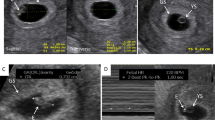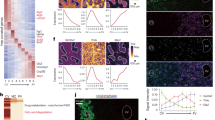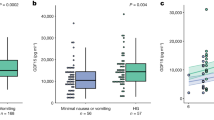Abstract
IN man foetal haemoglobin (Hb F, α2γ2), which is the main respiratory protein throughout intrauterine life, is almost completely replaced by adult haemoglobin (Hb A, α2β2) during the first 6 months after birth. The mechanism of the switch from γ to β-chain production is unknown. In intra uterine life erythropoiesis occurs first in the yolk sac, then in the liver and spleen and finally in the bone marrow1. Hb A production occurs at a low level from about the ninth to twelfth week of gestation2–6 and there is evidence that foetal liver can synthesize both Hb A and F4,7. It is not known, however, whether the switch from Hb F to Hb A production is synchronous in different foetal organs, which might be expected if it were hormonally controlled, or whether there are local organ-specific differences in the rate of change from Hb F to A production. To examine this problem, and to obtain further information about the pattern of Hb A production in early intrauterine life, we have examined Hb synthesis in foetal organs at different stages of development.
This is a preview of subscription content, access via your institution
Access options
Subscribe to this journal
Receive 51 print issues and online access
$199.00 per year
only $3.90 per issue
Buy this article
- Purchase on Springer Link
- Instant access to full article PDF
Prices may be subject to local taxes which are calculated during checkout
Similar content being viewed by others
References
Oski, F. A., and Naimon, J. L., Haematological Problems in the New Born, second ed. (W. B. Saunders, Philadelphia, 1972).
Walker, J., and Turnbull, E. P. N., Arch. Dis. Child., 30, 111 (1955).
Hollenberg, M. D., Kaback, M. M., and Kazazian, H. H., Science, 174, 698 (1971).
Bosch, R. S., Blood, 39, 530 (1972).
Kan, Y. W., Dozy, A. M., Alter, B. P., Frigoletto, F. D., and Nathan, D. G., New Engl. J. Med., 287, 1 (1972).
Pataryas, H. A., and Stamatoyannopoulos, G., Blood, 39, 688 (1972).
Thomas, E. D., Lochte, M. L., Greenough, W. B., and Wales, M., Nature, 185, 396 (1960).
Dozy, A. M., Kleihauer, E. F., and Huisman, T. H., J. Chromatog., 32, 723 (1968).
Bray, G. A., Anal. Biochem., 1, 279 (1960).
Clegg, J. B., Naughton, M. A., and Weatherall, D. J., J. Mol. Biol., 19, 91 (1966).
Capp, G. L., Rigas, D. A., and Jones, R. T., Nature, 228, 278 (1970).
Weatherall, D. J., Clegg, J. B., and Wong, H. B., Brit. J. Haematol., 18, 357 (1970).
Kleihauer, E., Proc. Int. Symp. Synthesis, Structure and Function of Haemoglobin, Bad Nauheim, 309 (edit. by Martin, H., and Nowicki, L.) (Lehmann, Munich, 1971).
Pembrey, M. E., Weatherall, D. J., and Clegg, J. B., Lancet, i, 1350 (1973).
Author information
Authors and Affiliations
Rights and permissions
About this article
Cite this article
WOOD, W., WEATHERALL, D. Haemoglobin Synthesis during Human Foetal Development. Nature 244, 162–165 (1973). https://doi.org/10.1038/244162a0
Received:
Issue Date:
DOI: https://doi.org/10.1038/244162a0
This article is cited by
-
Axonal localization of neuropeptide-encoding mRNA in identified neurons of the snail Lymnaea stagnalis
Cell and Tissue Research (1994)
-
RNA in the axonal domain: a new dimension in neuronal functioning?
The Histochemical Journal (1994)
-
Visualization of polyribosomes in the postsynaptic area of the squid giant synapse by electron spectroscopic imaging
Journal of Neurocytology (1989)
-
Haemoglobin switching in human embryos: asynchrony of ζ → α and ε → γ-globin switches in primitive and definitive erythropoietic lineage
Nature (1985)
-
Origin of axoplasmic RNA in the squid giant fiber
Neurochemical Research (1983)
Comments
By submitting a comment you agree to abide by our Terms and Community Guidelines. If you find something abusive or that does not comply with our terms or guidelines please flag it as inappropriate.



